Creating an inspiring, functional workspace doesn’t require a massive investment. With the right approach, Low Budget Small Office Interior Design is not only achievable—it can be stylish, efficient, and uniquely yours. Whether you’re a freelancer, startup founder, or small business owner, this 2025 guide will help you turn your compact space into a productivity powerhouse without draining your wallet.
Welcome to the ultimate guide to low-budget small office interior design. In this article, we’ll explore various design ideas, tips, and strategies to create an efficient, aesthetically pleasing, and functional workspace within a limited budget.
Importance of Low Budget Small Office Interior Design
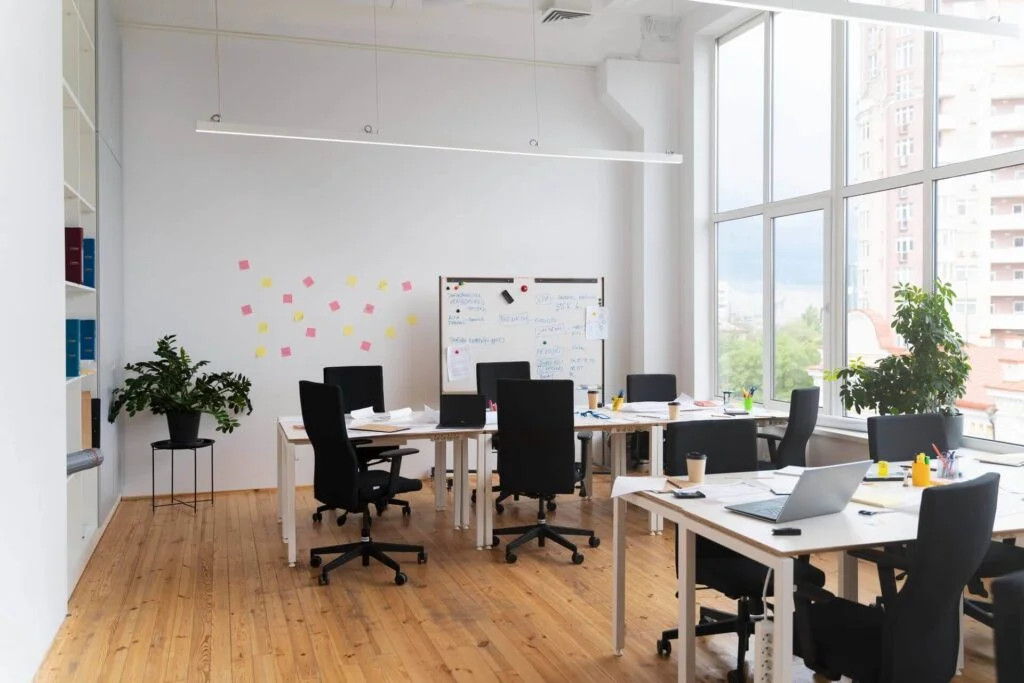
Low-budget small office interior design aims to maximize available space and employ cost-effective design strategies to establish a comfortable, productive, and motivating workspace. Following are some pointers about the Importance of budget friendly office interior design:
- Enhancing productivity, employee satisfaction, and overall business success relies on a well-designed office space.
- Small businesses and startups often face financial constraints, making it difficult to invest in expensive office renovations.
- Low budget small office interior design offers a solution by utilizing cost-effective design principles and creative solutions.
- By implementing these strategies, you can transform your office into a professional, inviting, and comfortable environment for your team.
Factors to Consider for Budget-Friendly Small Office Interior Design
Before diving into design ideas, it’s essential to consider several factors that play a crucial role in low budget office design.
By understanding these factors, you can make informed decisions that maximize your budget and create a workspace that meets your specific needs
1. Space Constraints: Assess the available space and identify the potential limitations and opportunities for optimizing the layout and functionality of your office.
2. Workflow and Employee Needs: Understand the workflow and requirements of your employees to design an office that promotes collaboration, focus, and efficiency.
3. Branding and Identity: Incorporate your brand’s values, colors, and visual elements into the office design to create a cohesive and professional atmosphere.
4. Long-Term Flexibility: Plan for future growth and changes by opting for versatile design solutions that can be easily modified or expanded.
Also Read:- 20 Inspiring Office Cabin Designs
Ideas for Designing Small Office Spaces on a Budget

1. Optimize Layout for small office interior design
Utilize the available space efficiently by adopting open floor plans, modular furniture, and multifunctional areas that serve different purposes.
2. Smart Storage Solutions
Maximize storage in small offices by using vertical space, investing in storage units, and implementing clever organizational systems.
3. Secondhand and Repurposed Furniture
Look for affordable options in thrift stores or online marketplaces and give old furniture a fresh look with a coat of paint or new upholstery.
4. Natural Lighting
Maximize natural light sources to create an open and airy atmosphere. Use sheer curtains or blinds to control the amount of light entering the space.
5. Task Lighting
Supplement natural light with task lighting options such as desk lamps or under-cabinet lights to ensure proper illumination for specific work areas.
6. Neutral Color Palettes
Opt for neutral colors like whites, grays, and beige to create a visually spacious and timeless environment. Incorporate Vibrant Accents and Artwork to Infuse Your Small Office with Color.
7. Compact Workstations for Small Office Interior Design
Choose space-saving desks and ergonomic chairs that provide comfort and functionality while fitting well within the limited space.
8. Indoor Plants
Incorporate greenery into your office design to improve air quality, reduce stress, and create a refreshing and welcoming ambiance.
9. Affordable Wall Decor
Enhance the aesthetics of your office with affordable wall decor options like framed prints, motivational quotes, or a corkboard for displaying ideas.
10. Cable Management
Keep cables and wires organized and hidden to maintain a clean and clutter-free workspace. Use cable management solutions or adhesive clips.
Maximizing Storage in a Small Office

One of the key challenges in small office design is storage. Limited space requires smart and efficient storage solutions to keep the office organized and clutter-free.
Here are some tips to maximize storage in your small office:
1. Vertical Storage: Utilize vertical space by installing shelves, wall-mounted cabinets, or bookcases. Make use of the height of the room to store items.
2. Under-Desk Storage: Opt for desks with built-in drawers or add under-desk storage units to keep essential items within reach but out of sight.
3. File Organization: Implement a filing system to organize paperwork and documents. Use labeled folders or color-coded file holders for easy retrieval.
4. Mobile Storage: Invest in mobile storage units like rolling carts or cabinets. They can be moved around as needed and provide additional storage flexibility.
Also Read:- 15 Best Office Wall Designs Ideas of 2023
Choosing the Right Furniture for Your Small Office Design
When working with a limited budget, it’s crucial to choose the right furniture pieces that offer both functionality and affordability. Here are some considerations:
1. Multi-Purpose Furniture for small office interior design: Look for furniture that serves multiple functions, such as desks with built-in storage or chairs that can be stacked when not in use.
2. Adjustable Furniture: Opt for adjustable chairs and desks that accommodate different body types and ergonomic needs. This promotes comfort and reduces the risk of strain or injury.
3. Collaborative Spaces: Incorporate furniture that facilitates collaboration, such as modular seating arrangements or standing-height tables for impromptu meetings.
4. Ergonomic Chairs: Invest in ergonomic chairs that provide proper lumbar support and adjustability to promote good posture and reduce discomfort during long hours of work.
Lighting Solutions for Small Office Interior Design
Lighting plays a crucial role in creating a welcoming and productive office environment. Consider the following lighting solutions for small office spaces:
1. Natural Light: Make the most of natural light by positioning workstations near windows or using glass partitions to allow light to flow throughout the space.
2. Artificial Lighting: Supplement natural light with artificial lighting options such as ceiling lights, task lamps, or pendant lights to ensure adequate illumination.
3. LED Lighting: Opt for energy-efficient LED lights to reduce electricity costs and provide consistent lighting throughout the office. Choose bulbs with a warm and comfortable color temperature.
Color Schemes and Their Impact on Productivity

The color scheme you choose for your office can have a significant impact on productivity, mood, and overall well-being. Checkout the following colors and their effects:
1. Blue Color: Blue color promotes calmness, focus, and productivity. It’s ideal for spaces where concentration and mental clarity are essential, such as creative or analytical work areas.
2. Green Color: Embrace the Soothing Essence of Green. It can reduce stress and enhance creativity, making it suitable for collaborative or brainstorming spaces.
3. Yellow Color: Yellow color is energizing and stimulates positivity. It can improve mood and motivation, making it ideal for areas where social interactions or brainstorming occur.
4. Neutral Tones: Neutral colors like whites, grays, and beiges create a clean and timeless backdrop. They promote a sense of professionalism and can be paired with accent colors for visual interest.
Creating a Functional Workstation for Small Office
A functional workstation is essential for productivity and comfort. Here are some tips to create a functional workstation in a small office:
1. Ergonomic Setup for small office design: Ensure your chair and desk are ergonomically designed to support proper posture and reduce strain. Adjust the height of your chair and desk to maintain a comfortable position.
2. Organized Desk: Keep your desk clutter-free by using organizers, trays, and desk accessories to store pens, notepads, and other essentials within reach but organized.
3. Cable Management: Use cable clips or cable sleeves to manage and hide cables on your desk. This not only keeps your workspace tidy but also reduces the risk of accidents or entanglement.
4. Personalization: Add personal touches to your workstation, such as a photo frame, a small plant, or motivational quotes. This creates a sense of ownership and boosts mood and productivity.
Incorporating Plants for a Welcoming Environment

Plants not only add a touch of nature to your office but also provide numerous benefits for the working environment. Here’s how to incorporate plants in a small office:
1. Desk Plants: Choose small, low-maintenance plants like succulents or small potted flowers to place on desks or shelves. They add a pop of green and improve air quality.
2. Hanging Plants: Utilize vertical space by hanging plants from the ceiling or using wall-mounted planters. They create visual interest and save valuable desk or floor space.
3. Plant Walls: Install a vertical garden or living wall to maximize greenery in the office. This not only enhances aesthetics but also provides natural sound absorption.
4. Maintenance Considerations: Select plants that thrive in indoor environments with minimal sunlight and require low maintenance, such as pothos, snake plants, or ZZ plants.
Budget-Friendly Decorative Elements for Your Small office Interior Design
Decorative elements can enhance the aesthetics of your office without breaking the bank. Consider these budget-friendly ideas:
1. Wall Art: Hang affordable prints or framed posters that reflect your brand or inspire creativity. Look for inexpensive options online or support local artists.
2. DIY Artwork: Unleash your creativity and create your own artwork using canvas, paint, or other materials. This adds a personal touch and saves money.
3. Area Rugs: Place area rugs to define different zones within the office and add warmth and texture to the space. Look for affordable options that complement your color scheme.
4. Accent Pillows and Throws: Add pops of color and comfort with inexpensive accent pillows or throws. They can instantly transform the look of chairs or sofas.
Ergonomics in the Small Workplace Design

Ergonomics plays a vital role in maintaining employee health, comfort, and productivity. Consider these ergonomic principles for your small office:
1. Adjustable Chairs: Invest in chairs that offer adjustable height, lumbar support, and armrests. This allows employees to customize their seating position for optimal comfort.
2. Monitor Placement: Position computer monitors at eye level to reduce neck strain. Use monitor stands or adjustable arms to achieve the correct viewing height.
3. Keyboard and Mouse: Provide ergonomic keyboards and mice that promote natural hand and wrist positions. Consider options like split keyboards or vertical mice to reduce strain.
4. Regular Breaks and Movement: Encourage employees to take regular breaks and move around to prevent prolonged sitting. Incorporate standing desks or active seating options if possible.
Creating Privacy in Open Office Settings
Maintaining privacy in open office settings can be challenging. Here are some strategies to create privacy without compromising the collaborative nature of the space:
1. Noise-Canceling Solutions: Install sound-absorbing panels or acoustic dividers to reduce noise and create a quieter environment for focused work or confidential conversations.
2. Privacy Screens: Use portable privacy screens or partitions to create designated areas for individual work or meetings. This provides a sense of seclusion when needed.
3. Phone Booths or Pods: Consider installing small phone booths or pods where employees can make private calls or engage in focused work without distractions.
4. Flexible Layouts: Design the office with flexible furniture arrangements that can be easily reconfigured to accommodate privacy needs or collaborative activities.
Organization Tips for Low Budget Small Office Spaces
Effective organization is essential in small office spaces to maintain a tidy and efficient work environment. Try these organization tips:
1. Declutter Regularly: Set aside time to declutter and remove unnecessary items from your office. Keep only essential items and create designated storage spaces for them.
2. Utilize Vertical Space: Install shelves, wall-mounted organizers, or hanging storage solutions to maximize vertical space for storing documents, supplies, or personal belongings.
3. Labeling System: Implement the utilization of labels or color-coded tags to classify and designate items. This makes it easier to locate things quickly and promotes organization.
4. Digital Organization: Embrace digital tools for document storage, note-taking, and task management. This reduces the need for physical clutter and improves accessibility.
Technology Integration in Low Budget Office Design
Integrating technology efficiently in your low budget office design can enhance productivity and streamline processes. Consider these technology integration ideas:
1. Wireless Connectivity: Invest in a reliable wireless network to ensure seamless internet connectivity throughout the office. This allows employees to work flexibly and collaborate wirelessly.
2. Cable Management: Use cable management solutions to keep cables organized and hidden. This not only improves aesthetics but also reduces the risk of accidents or tangling.
3. Charging Stations: Set up designated charging stations for employees to charge their devices conveniently. By doing so, the requirement for numerous power outlets is eliminated, leading to a reduction in cable clutter.
4. Productivity Apps and Software: Explore productivity apps and software solutions that streamline workflows, facilitate communication, and enhance collaboration within the team.
Common Mistakes to Avoid in Low Budget Office Design

When working on a low budget, it’s important to avoid common design mistakes that can compromise the functionality and aesthetics of your office. Below are some errors to avoid:
1. Sacrificing Comfort for Cost: While cost is a crucial factor, don’t compromise on the comfort and well-being of your employees. Invest in ergonomic furniture and quality seating options.
2. Overlooking Lighting: Adequate lighting is essential for productivity and employee well-being. Don’t overlook the importance of proper lighting solutions, both natural and artificial.
3. Ignoring Storage Needs: Insufficient storage can lead to a cluttered and disorganized office. Plan for ample storage solutions to keep the office tidy and functional.
4. Neglecting Branding: Your office should reflect your brand’s identity and values. Don’t overlook the opportunity to incorporate branding elements into the design, such as colors or logos.
Conclusion
Designing a low budget small office interior requires careful planning and consideration. By maximizing space, incorporating functional furniture, optimizing lighting, and utilizing smart storage solutions, you can create a productive and inviting work environment.
Dezinespace blog, your ultimate destination for all things related to interior designs. Remember to prioritize comfort, ergonomics, and the specific needs of your team. With creativity and attention to detail, even a small office can become a thriving workspace.
Frequently Asked Questions
Designing a small office on a tight budget requires careful planning and creative solutions. Consider utilizing secondhand or repurposed furniture, maximizing natural light, incorporating plants, and utilizing storage solutions to optimize the space. Additionally, prioritize essential items and invest in quality ergonomic furniture for long-term comfort.
Maximize storage in small offices by utilizing vertical space with shelves and wall-mounted organizers. Invest in mobile storage units like rolling carts or cabinets. Implement a filing system with labeled folders or color-coded file holders. Make use of under-desk storage options and consider multifunctional furniture with built-in storage.
Creating privacy in an open office setting can be achieved through various strategies. Install sound-absorbing panels or acoustic dividers to reduce noise and create a quieter environment. Use portable privacy screens or partitions to create designated areas for focused work or confidential conversations. Consider incorporating phone booths or pods for private calls or individual work.
Integrate technology efficiently in your low budget office design by ensuring reliable wireless connectivity throughout the office. Implement cable management solutions to keep cables organized and hidden. Set up designated charging stations for convenient device charging. Explore productivity apps and software solutions that streamline workflows and enhance collaboration.




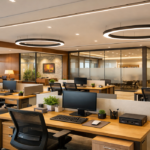
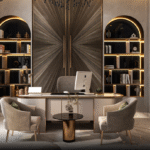

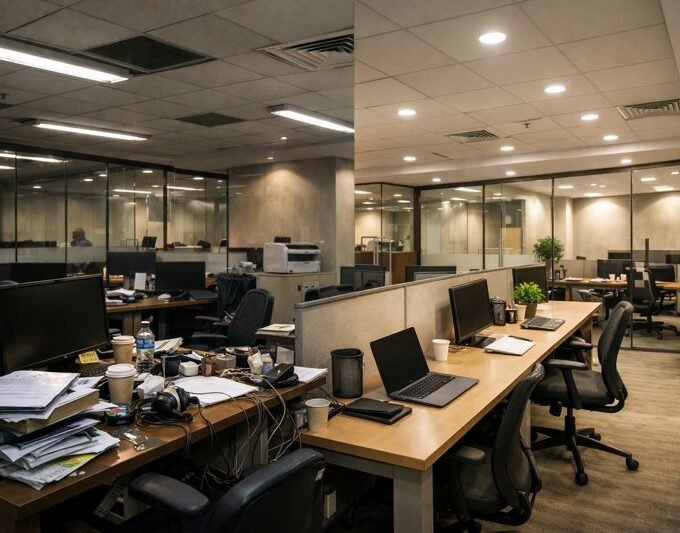

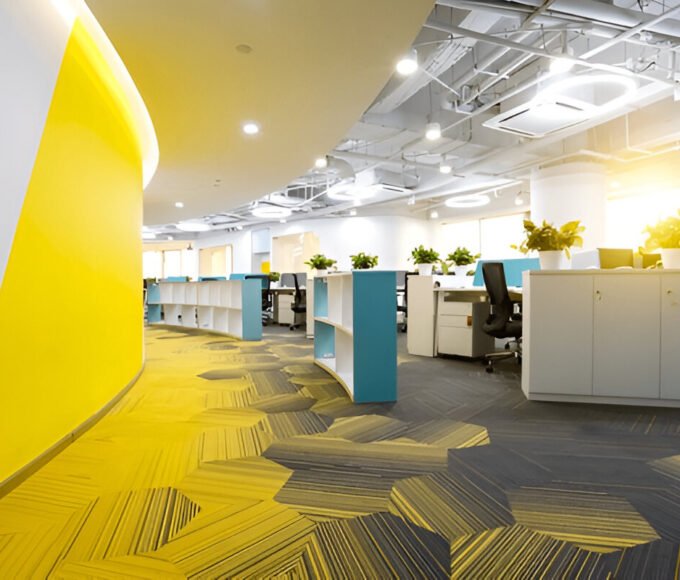
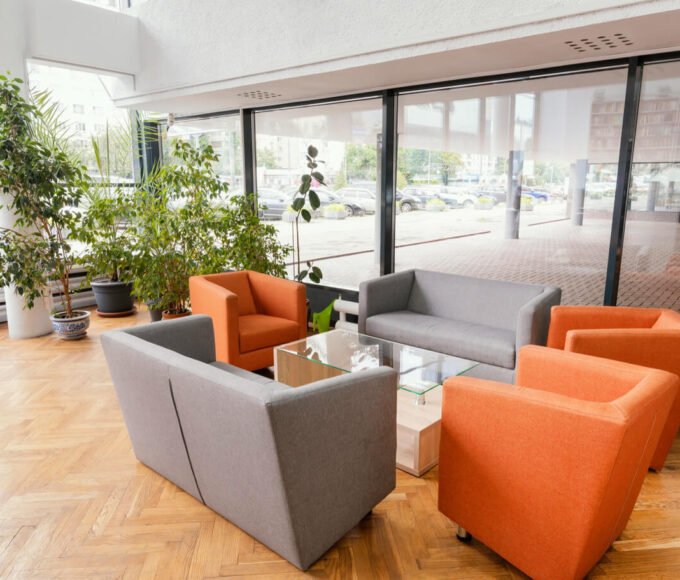
Leave a comment